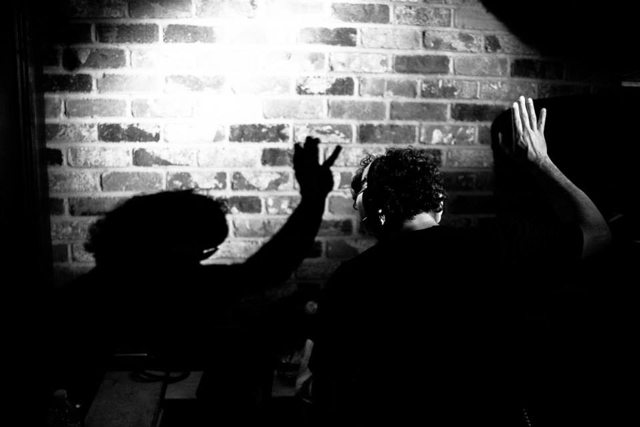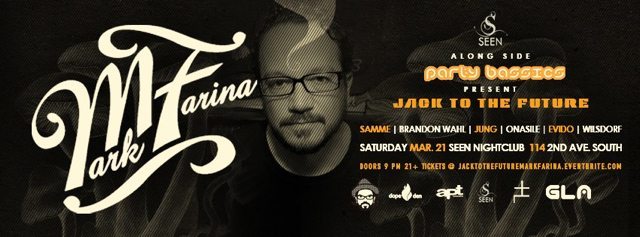 Nashville has a very special night ahead. Tomorrow, Saturday 3/21/15, the Chicago House/Mushroom Jazz legend Mark Farina will bring his sexy tunes to Seen, a club in downtown Nashville. It has been quite a little while since we last had the pleasure to dance into the wee hours to beats that will even make the crankiest of cranky people smile. Forget the dreary, overcast weather for a while and let your inner sunshine out.
Nashville has a very special night ahead. Tomorrow, Saturday 3/21/15, the Chicago House/Mushroom Jazz legend Mark Farina will bring his sexy tunes to Seen, a club in downtown Nashville. It has been quite a little while since we last had the pleasure to dance into the wee hours to beats that will even make the crankiest of cranky people smile. Forget the dreary, overcast weather for a while and let your inner sunshine out.
Yesterday, I got on the phone with Mark Farina and asked him a few questions. Here is what he had to say:
BLANK: You’re mostly known for your Mushroom Jazz series. What can we expect on Saturday? Are you planning to stick to your classic sound or will you switch it up?
MF: I’ll know more when I get there. I’m thinking more of a house-y thing. I know it’s a Saturday night. So I’ll probably keep it a Chicago/SF deep house type of thing and maybe break it down at the end to some Mushroom Jazz stuff possibly. I don’t pre-plan sets too much. I just sort of wing it, so to speak.
BLANK: You’ve been doing this since you were 15 years old. Did you always know that this would be your path in life, or did you ever consider a career change?
MF: Yeah, I started early. But at the time I started, it wasn’t really proven that there was any sort of DJ career going on. When I was starting, the only goal was to get your mix on the radio, which wasn’t really a paying gig, so to speak. You just wanted to get mixes on the radio, so you could be heard in Chicago. I never really thought about it as a job much. And then eventually I was a waiter in college and I had to give up a waiter shift because I had a chance to do a DJ gig the same night, which was making me about the same money from tips to DJ gig – which back then you got paid about $10/hour for a DJ gig at a Chicago club. So you’d play all night from like 9:00 to 4:00. And I thought: “Well, it’s definitely more fun to deejay than to wait tables for about the same amount of money.” So I gave up my Friday night shift and took the club gig. It wasn’t really ever a career sort of plan, it just came by by accident, basically. It was just a passion and then more jobs came up and the chance to play.
And then the whole DJ thing started happening in Chicago around 88 or 89. The first guest DJs to start playing in Chicago from somewhere else would have been like Doc Martin and Keoki. Chicago for a while didn’t have guest DJs because there were so many DJs in Chicago. So the concept of DJs traveling was kind of new to us in Chicago. And we thought: “Oh that’s cool. You just go to another city and play?” Rock bands had always done that, but it was sort of new in the late 80’s period to go around and deejay different places. So yeah, it was kind of a job that happened by lucky accident.
BLANK: Do you prefer playing festivals or at clubs?
MF: I like both, they’re both very different. I like being face to face with the audience in club set-ups. It’s fun when you’re at the same level with your crowd and there’s no kind of gap between you and the people. It’s just your DJ set-up and right behind is the dance floor, directly attached to the booth. And then at festivals you can get bigger sound systems, which has its benefits. And also at a festival you can get to play with a bigger line-up, like kind of old rave days when you got to play with five or six other people. That is fun as well and I kind of miss that from the rave days: being on a big bill with a bunch of friends. So there’s advantages to both.
At festivals, too, there’s more of a chance to get new listeners involved. At clubs it tends to be more people in the know, who know what’s going on, than people who are coming out for the first time. But at a festival you get some that are coming for other shows, who might not have heard of you, but then end up at your set and maybe become a new fan. So festivals are good for reaching a new audience base.
BLANK: The last Mushroom Jazz (7) release was in 2011. Are there any plans for a Mushroom Jazz 8 album?
MF: Yes, there is. Maybe at the end of this year. We’re trying to figure out a release date and are checking some different options of how to release that.
BLANK: What new artist or sound is peeking your interest these days?
MF: There are some great old producers that have been around that I’m into that are still making good stuff. New-wise I like Detroit Swindle. Their stuff is really good. They’ve been on the scene a couple of years, but they haven’t been to America all that much. Some old heads would be Lance DeSardi, an old Chicago buddy, who’s been coming back with some great new tracks. And Miguel Migs has always been putting out some good stuff and JT Donaldson.
Some of the newer guys would be like…there’s a new label called Enby out of Philly that’s been putting out some good stuff from different new artists. A label called Editorial out of Montreal that’s got new disco-y stuff. I like that sound as well, which is sort of a newer sound in the last few years, which is taking disco stuff and making it a little more dance floor friendly.
BLANK: DJs nowadays are receiving a lot of criticism about “just pushing play.” How do you feel about the evolution of DJ culture?
MF: Of course from starting in the late 80’s and early 90’s there was only one way you could play and it was vinyl. And now things have become sort of blurred of what a DJ is actually doing, in terms of what software they’re using and what they’re mixing with. There are so many different types of hardware a DJ can use now. When I think about a club atmosphere, it’s kind of helpful because you can actually see what the DJ is doing. Sometimes at festivals, when someone’s off in the distance, it might be hard to decipher exactly what’s going on. I mean I think all the real mixer DJs, all the true mixers, it is still about selection. You can’t take bad songs and mix them together well and make them sound good. So if someone can at least select good songs…There are now ways to cheat that, which we didn’t have in the past. But I think people are becoming more aware of those things as time goes by, that there are those technology tricks, so to speak. So obviously it comes down to selecting good songs, you know. It doesn’t necessarily matter how much you’re mixing them. I don’t know. I know to the old Chicago crew, mixing was always to the utmost importance. You could have all the great records, but you also had to mix them well.
BLANK: Do you still use vinyl?
MF: Yes. I just did a vinyl night in San Francisco on Friday. I still buy records and still play records. I still have all of my old records as well. I never got rid of any of them.
BLANK: Any advice to the many broke DJs out there trying to make it?
MF: I would say hit up the labels of stuff you like. Introduce yourself, let them know what you’re doing if you’re in town. Get a SoundCloud page – I love SoundCloud. It’s the mix tape of the future, so to speak. As opposed to when I was making demos. To start, you had to dub up ten mix tapes, which took quite a bit of time. Even if you had a double-speed dubber, you’re sitting there flipping tapes all day, all afternoon. Now with SoundCloud you can do your mix, post it and see where it goes.
Obviously, if you’re up and coming, making tracks is a good way to get your foot in the door to a lot of places. And I think the barriers of making tracks have been broken down over the years. Now if you don’t have your own gear programs, I’m sure everyone has some friend that’s got some sort of beat-making program on their computer, as opposed to 20 years ago when you had to have the drum machines and synthesizers and had to have a studio. Now the gear is a little more accessible. So if you have a certain label sound you like and you make some tracks and send them to them that’s a way to get on mailing lists.
Before, in the vinyl promo days, it was even harder to get on mailing lists because it took quite a bit of effort to take the promo record, put it in a sleeve and physically mail it. You know, you’d have to mail people. I used to live with Derrick Carter, who was like the promo master. He’d get everything before it was out. And I’d be like: “Oh man, how did you get that?” He knew the people and he’d have a stack in the mail everyday of ten brand new things. This was like 1990 and it would be the hottest things and I’d be like: “Damn you, I’m trying to email these people to get copies, too.” But now, in this digital world, they don’t have only ten promos in the office that they can send out, to where they have to pick the ten best DJs. If you can kind of just get friends with people it’s all about clicking and getting on a mailing list and there you’ve got your tracks sent right to your email.
So sort of getting a repertoire together with labels you like. You might not get a promo that week, but you keep trying and that’s a good way to get on a DJ promo list. And there’s also now a lot of DJ promo services that have a lot of labels. So once you get on one list you start to trickle down and get on others.
BLANK: And for your Nashville fans, do you have any after-party plans on Saturday or would you rather go honky tonking down Broadway?
MF: No plans as of yet. We’ll see what unfolds during the evening. I’ll keep that on the DL.
To find out more details about tomorrow’s event featuring Mark Farina, click here: https://www.facebook.com/events/1596362387261703/








